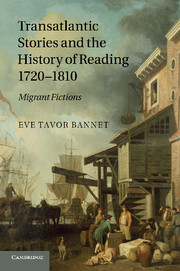Book contents
- Frontmatter
- Contents
- List of illustration
- Acknowledgments
- Introduction: Transatlantic stories and Transatlantic readers
- PART I “POOR MAN'S COUNTRY”
- PART II THE SERVANT'S TALE
- 5 The bonds of servitude
- 6 Bond and free: contemporary readings of Gronniosaw's Life
- 7 Samson Occom's itinerancies
- PART III PRINTSCAPES
- Afterword
- Notes
- Works cited
- Index
6 - Bond and free: contemporary readings of Gronniosaw's Life
Published online by Cambridge University Press: 05 July 2011
- Frontmatter
- Contents
- List of illustration
- Acknowledgments
- Introduction: Transatlantic stories and Transatlantic readers
- PART I “POOR MAN'S COUNTRY”
- PART II THE SERVANT'S TALE
- 5 The bonds of servitude
- 6 Bond and free: contemporary readings of Gronniosaw's Life
- 7 Samson Occom's itinerancies
- PART III PRINTSCAPES
- Afterword
- Notes
- Works cited
- Index
Summary
With the exception of Venture Smith, the major black, English-language, prose authors of this period had not been plantation slaves. Briton Hammon, James Gronniosaw, Ignatius Sancho, John Marrant, Ottobah Cugoano, Olaudah Equiano, and Boston King were or became mariners, preachers, musicians, soldiers and personal servants. That is to say, by chance or more often by design, they had moved into the principal upwardly, as well as geographically, mobile occupations open to enslaved Africans in Britain and America at this time. These were all occupations practiced by the free and the unfree, and by whites as well as blacks, which sometimes provided enterprising slaves with an opportunity to attain literacy and to obtain their freedom. With the exception of Briton Hammon, all these black authors published as free men. Consequently, while each depicted the evils of chattel slavery, and some openly pushed for abolition, they also offered strategies for negotiating servitude and raised the pressing issue of how, once free, black people could support themselves and their families. Where the stories about white servants in the last chapter struggled with the evils of bondage and looked out to freedom through the keyhole of running away, the narratives here look back at bondage from a perilous condition of freedom, where abject poverty and inability to find work as someone's servant were not coincidentally allied.
- Type
- Chapter
- Information
- Transatlantic Stories and the History of Reading, 1720–1810Migrant Fictions, pp. 139 - 157Publisher: Cambridge University PressPrint publication year: 2011



